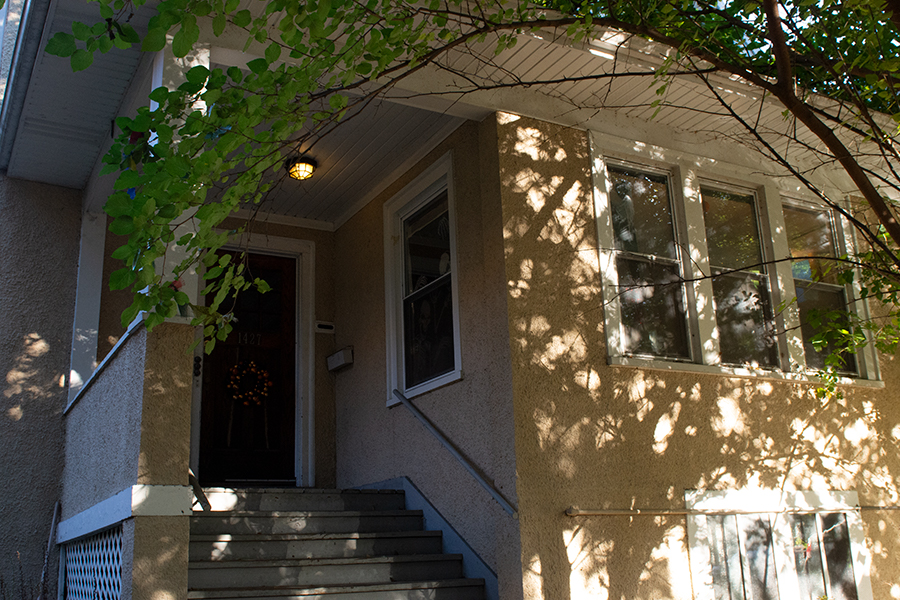MOSAIC co-op closes one house amid pandemic and rising rent
Angeli Mittal/Daily Senior Staffer
The Zooo. The MOSAIC co-op closed one of their two houses earlier this year.
October 18, 2021
From January to June, Communication junior Clay Lawhead enjoyed living in an environment he felt was “almost like socialism.”
Lawhead, a former Daily staffer, lived for those six months in MOSAIC, a housing co-op close to Northwestern’s campus that has long maintained two houses: “Zooo” and “Treehouse.” There, members shopped together, cooked meals for one another and helped each other with cleaning responsibilities and house upkeep. He compared the experience to living in a residential college and said the people living in the Zooo were willing to “put in work for the community.”
However, Lawhead was also one of the Zooo’s last residents. The house closed its doors in July after operating for 17 years.
Lawhead said affordability originally drew him to the co-op.
“I get more and more angry every day about affordable living in the city of Evanston specifically,” he said. “It’s a college town, and I would really love to see the co-op up and running again.”
During his time living in the Zooo, the cost of renting a room rose to match the cost of living in other Evanston apartments and houses. This made recruiting new residents difficult, so MOSAIC had to leave the house.
MOSAIC’s second location, the Treehouse, will remain operational this year.
Weinberg senior Aili Simpson, who lived in the Zooo at the same time as Lawhead, applied to live in the co-op in early 2020. She said the idea of living with people in an intentionally cooperative community initially drew her to MOSAIC. She most looked forward to sharing meals with interesting people.
When she moved in during early September 2020, she said the Zooo’s 10 to 13 quarterly residents met to establish a set of strict pandemic guidelines designed with everyone’s living needs in mind. The residents ranged from sophomore students to Ph.D. candidates, and all went in with different ideas for what “social distancing” and “safety” meant, she said.
The rules included a strict ban on going into others’ homes or allowing guests into the Zooo. Taking public transportation also required other residents’ approval. There was no housewide COVID-19 outbreak during the 2020-2021 academic year, but Simpson said residents clashed over the way the house’s COVID-19 guidelines were executed. According to Jessica Kang (McCormick ‘21), two people left the house over COVID-19 concerns last fall.
Co-op members typically recruit new residents through social media campaigns and word-of-mouth. But Simpson said this slowed down due to high resident turnover last year. Ultimately, she said it became unsustainable for Zooo’s remaining residents to keep the house running, especially since there’s often a learning curve to the co-op living style.
“Not many people wanted to stay on for another year,” Simpson said. “Essentially, if we had continued or somehow worked that out, the burden of teaching everyone else to live in a community, in an intentional community, would have been on just one or two people who chose to stay in the co-op, and that’s too much to ask.”
Kang, who started living in the Zooo in fall 2020, also noted rising rent prices brought residents stress, especially as necessary housing repairs became more pressing. The house is so old, she explained, that the cost of maintaining a comfortable living environment can cause rent to spike faster than some co-op residents expect.
Although it wasn’t perfect, Kang said she enjoyed her year living in the Zooo. Her memories of going on group walks, making pumpkin pies during Halloween and even teaching one roommate to swim defined her time at Northwestern, she said.
“I’m really sad that the Zooo couldn’t continue,” Kang said. “I hope some people one day decide to bring it back.”
Email: oliviaalexander2024@u.northwestern.edu
Twitter: @oliviagalex
Related Stories:
— MOSAIC Co-op offers conscious off-campus living
— Wild Onion Market to bring first community-owned food co-op near South Evanston


